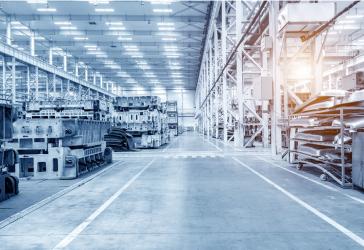
We live in turbulent times: trade wars between major world powers, the rise of populism, and more local issues such as Brexit in the UK create an uncertain landscape for many manufacturers.
While these challenges have a very real impact on business, often disrupting long-established operations and integrated supply chains, tomorrow’s manufacturing will be shaped by companies that take a long-term view.
This need for perspective was discussed among leading manufacturers and industry experts at the FT Future of Manufacturing Summit 2019, hosted this October in London by the Financial Times.
The challenges of climate change and the impact of technologies such as AI and automated production will still be transforming the sector long after current trade issues have been resolved.
Lower carbon output
Speaking at the event, Hitoshi Kaguchi, Co-Chief Strategy Officer & Head of Marketing & Innovation at Mitsubishi Heavy Industries (MHI), explained how companies like MHI were focused on major trends impacting industry, rather than short-term political waves or uncertainties.

“I am more concerned with issues like the need to decarbonize,” he told the panel. “We have been moving away from the coal-fired power-generating past, working on cleaner solutions like hydrogen. We are thinking ahead to what will be needed in 10 or 20 years rather than next year or the one after.”
Manufacturers that recognize and embrace the long-term overarching trends affecting the sector are well placed to capitalize on new opportunities. The changes taking place can be good for business, good for consumers and good for the planet.
Sustainable production was high on the agenda at the summit, as industry leaders move towards a manufacturing base powered increasingly by cleaner energy sources such as hydrogen, wind and solar power.
When carbon capture technologies – which prevent emissions from industrial processes reaching the atmosphere – are added to the mix, manufacturers have a real opportunity to help achieve a low-carbon society.
These technologies present an opportunity to redistribute jobs from cities and towns to rural areas with low employment. Offshore wind farms or carbon capture and storage facilities are not going to be delivered in crowded cities.

“Decarbonization and some sort of green new deal offer a chance to rejuvenate and regenerate parts of the UK and the wider global economy that have been left behind,” said Rachel Reeves, MP and Chair of the UK Parliament’s Business, Energy and Industrial Strategy Committee.
The road to sustainable production also involves manufacturers looking inwards to develop less carbon-intensive practices, as well as delivering solutions that enable customers to reduce their carbon footprint.
“At MHI, we take a holistic approach to sustainability,” said Kaguchi. “We find solutions that have a significant impact on whole industries.”
A good example of this is additive printing, which can transform how some manufacturers, and their customers, produce goods. Metal 3D printers can enable flexible, accurate and consistent production of components – from finely tuned aircraft parts to ultimately, mass-produced automotive components.
Printers can be located wherever they are required by the manufacturer or their clients, eliminating the need to ship finished goods, which cuts transport emissions.
This reflects a wider trend among some manufacturers that are moving away from traditional mass-scale centralized manufacturing, to more flexible, smaller-scale production operating closer to the end user.
Establishing different manufacturing sites and diversifying business operations, Kaguchi told the conference, helps manufacturers overcome the challenges presented by trade wars and economic uncertainty.
Digitization has made this innovation possible and continues to produce new processes and technologies that raise manufacturing to new levels.
However it is labelled – the Digital Revolution, the Fourth Industrial Revolution, Industry 4.0 – the impact of AI and automation have profoundly changed how goods are designed, produced and maintained.
Manufacturers can create a digital twin of a product to simulate its design, production and performance, cutting development time, reducing costs and optimizing performance.
Autonomous manufacturing systems operate in real time, gathering data to improve current and future production. Problems can be detected even before they occur, and the carbon footprint of each product measured and reduced.
The growing influence of technology allows tools such as AI and automation to create new opportunities for human operators.
In a session called The Digital Future Starts Today, discussion centered around a manufacturing future enabled by AI-tools, where humans and robots increasingly interact and work together.
Of course, there is no crystal ball to tell the future. But the impact of technology and the growing need for sustainable production will no doubt influence manufacturing for decades to come.
While trade wars and other geopolitical issues come and go, manufacturers must focus on creating solutions that address the long-term challenges that will inevitably reshape the sector’s future.
Source : https://spectra.mhi.com/the-future-of-manufacturing-short-term-challenges-need-a-long-term-view
